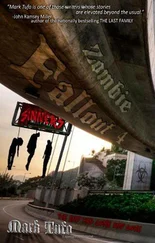Amber introduced us to Becky, who was bashful and hid behind her mother’s sturdy leg. We looked around for Larry, but he was gone. We avoided the topic by concentrating on the kid. Eventually we entered back into adult conversation, and that’s when Becky came out from behind Amber’s leg and approached Benny. She seemed interested in introducing him to her naked and soiled doll. He bent down and made its acquaintance. Everyone congratulated Genevieve on her baby as well, and her husband answered for her when we asked how old it was (ten months), because Genevieve and Amber were lost to stories of motherhood.
The funny thing about work itself, it was so bearable. The dreariest task was perfectly bearable. It presented challenges to overcome, the distraction provided by a sense of urgency, and the satisfaction of a task’s completion — on any given day, those things made work utterly, even harmoniously bearable. What we bitched about, what we couldn’t let lie, what drove us to distraction and consumed us with blind fury, was this person or that who rankled and bugged and offended angels in heaven, who wore their clothes all wrong and foisted upon us their insufferable features, who deserved from a just god nothing but scorn because they were insipid, unpoetic, mercilessly enduring, and lost to the grand gesture. And maybe so, yes, maybe so. But as we stood there, we had a hard time recalling the specific details, because everyone seemed so agreeable.
At Benny’s suggestion we headed out for a drink. There was an Irish pub nearby and we brought tables together and Carl Garbedian bought the first round, which was only right given his twenty suburbs, and we toasted Hank and his accomplishment, and we talked of regrets and of old times and happily recalled that not all had been misery. By the time we had worked down that first round, we had reason to remember that Benny had been a good storyteller, and Jim Jackers a good sport, and Genevieve a pleasure to look upon. And Lynn Mason, we all agreed, had been a better boss than any we’d found since. Next to Handlebar Harry, who defied our drinking expectations by ordering a cup of decaf, Janine sat sipping her familiar frosted glass of cranberry juice, which was somehow comforting. She reached out to tap Hank on the hand. “I’ve read your book, Hank,” she said.
“Oh,” said Hank. “Thank you.”
“It’s about Lynn, isn’t it.”
“Well,” he said. “Some of it is based on Lynn, yes.”
We couldn’t believe it. His book was about Lynn?
“And is it true?” she asked.
“The book? No, the book is. . which part?”
“Any of it.”
“Well, I visited her several times in the hospital,” he said.
Wait a minute, we thought, wait a minute. He had visited her in the hospital?
“In the first book I tried to write,” he explained, “the book I put down, I based a character on Lynn, and I made that character into a tyrant. I did it on principle, because anyone who was a boss in that book had to be a tyrant. Anyone who believed in the merits of capitalism, and soul-destroying corporations, and work work work — all that — naturally that person wasn’t deserving of any sympathy. But when I decided to retire that book, thank god, and write something different, I knew she was sick, so I went to see her. Just on a lark. Because what did I know about her? Nothing, really. I didn’t know her — not in any meaningful way. And it turned out she was very open to talking with me, not only about her sickness, but also her personal life, a lot of other things. She was dying at the time —”
Jim Jackers stopped him. “What do you mean?”
“Lynn died in the summer of 2003,” Hank replied. “Of ovarian cancer.”
“Am I the only one who didn’t know that?” Jim asked, looking around.
“And I think she knew she was dying,” Hank continued, “and in a way, I also think she hoped that I would write something worth a damn, which I can tell you, I did not. I can assure you I did not. Not with respect to her, anyway.”
Janine objected. “I’ve read it,” she said. “You most certainly did.”
“Trust me,” Hank told her. “I didn’t get the half of it.”
GENEVIEVE AND HER HUSBAND LEFT because they had to put the baby to bed, and we lost Amber and Becky, too. Benny didn’t want them to go — all his windows were fogged up with nostalgia — but they insisted they had to get home. He demanded that the rest of us stay, and so we stayed. Most of us wanted another drink anyway. Marcia hit the jukebox with about a week’s salary and played one saccharine ballad after another and it felt like not a day had passed since we’d parted. Jim Jackers bought the next round, which was only right given his inexplicable rise up the ladder, and the fact that we’d had to suffer him during his weaning years.
We toasted to Lynn Mason’s memory and found ourselves telling stories of her, encounters and exchanges we had no trouble recalling the way we had, say, encounters with Old Brizz — she was our boss, after all, and we all had our separate and memorable experiences with her. None of us could forget, for example, the thrill and glory we experienced when she took a particular liking to a concept one of us had come up with, and we recalled with startling accuracy what job it was for, and the concept, and the reasons she gave for her admiration. Nobody’s approbation meant more to us than hers, and nothing was easier than recalling her words of approval. We also remembered her expensive and delicate shoes, and the time she showed up at Carl’s bedside with a pathetic bouquet of flowers, and how she had put up flyers for Janine alongside the rest of us when Jessica went missing, and Jim told us the story of being in an elevator when she told him that she had once been a hula girl. “She was just joking,” he said, “but I took her so seriously.” We remembered that despite how formidable she always seemed, a lot of the things she said were funny.
By the end of the second round, Sandy Green from payroll said she had to get home, and so did Donald Sato and Paulette Singletary. Benny begged them all to stay. He wanted to talk about whether or not they were currently happy at their new jobs, what the people were like, and if they had any complaints. “You know,” he prodded, “compared to how it used to be.” They stayed for a while longer, but when finally they left, Benny looked downcast. “What was that Tom Mota used to say, the send-off he used to give when somebody quit? Anybody remember?”
No one did.
“It was a toast,” said Benny, “and it went something like ‘So good luck to you.’ And then he’d finish off his drink, remember, and sort of burp? And then he’d bring the glass back up and say, ‘And fuck you for leaving, you prick.’”
Everyone laughed, though it wasn’t strictly speaking very funny — in fact, it was pretty uncomfortable. When the laughter died down, we wondered aloud what had happened to Tom and why he wasn’t at the reading.
“You don’t know about Tom?” said Carl.
Nobody knew a thing.
“Do you know he joined the army?”
Joined the army? Carl was pulling our leg.
“No, it’s true.”
“Come on,” said Benny.
“Nobody else got Tom’s e-mails?”
No one could say they had.
“Strange. He used to write to everybody.”
“Come on,” said Benny. “They let that nut join the army?”
“Superior marksmanship skills,” Carl said simply.
Suddenly a crazy notion almost seemed possible.
“He was looking at jail time,” Carl continued, “you know that much. But his wife, Barb, testified on his behalf. And so did Joe Pope. Yeah,” he said, to our expressions of disbelief. “And so the DA agreed to reduce the charges down to a misdemeanor. After that, he came to work for me for a time. But not for very long. He kept talking about wanting to join up — after all that had happened, you know. He just couldn’t get it out of his head. He was afraid he was too old. And he was afraid they wouldn’t take him because of his record. But it kept gnawing at him. He wouldn’t go down to talk to a recruiter, though, because he was afraid they’d tell him no — he wanted it so badly. He didn’t want somebody telling him no. But one day on a prayer he just went down there, and by sheer luck, he and the recruiting officer hit it off, they just hit it off right away. Tom told him what he wanted to do and how bad he wanted it, and the guy, the recruiting officer, arranged it so Tom could show him what he had to offer. And after they saw him shoot, they said, You want to join up, we’re happy to have you. So Tom joined the army.”
Читать дальше












